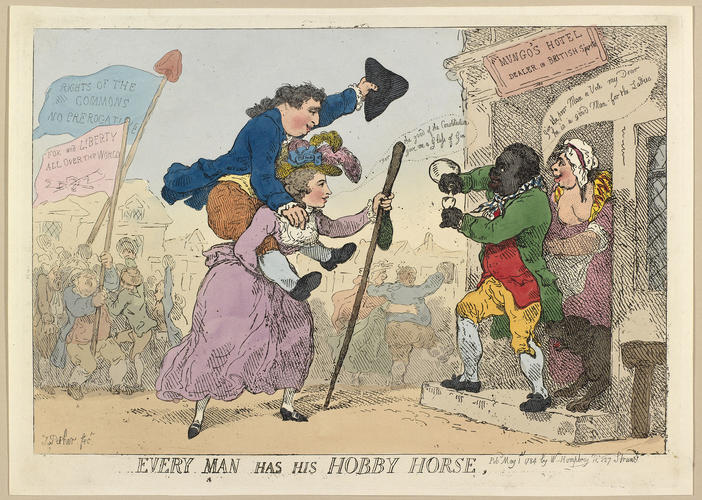Every man has his Hobby-Horse. 1 - 1 May 1784
Hand-coloured etching | 25.4 x 35.8 cm (sheet of paper) | RCIN 810079
-
A hand-coloured satirical print of the Duchess of Devonshire carrying Charles James Fox on her back. She holds a staff and Fox waves his hat, and they advance towards a tavern. A sign proclaims that this is ‘Mungo’s Hotel. Dealer in British Spirits’. The Black proprietor pours a glass of gin for the duchess, urged on by a white woman standing behind him. She says ‘Give the Man a Vote my Dear he is a good Man for the Ladies’. In the left background stands a mob waving banners and flags in support of the Whig party (of whom Fox was the leader).
This is one of a number of satirical prints made by Rowlandson at the time of the general election of May 1784, when the seat of Westminster (returning two MPs) was bitterly contested between Fox and Sir Cecil Wray and Samuel Hood (supporters of Fox’s rival Pitt). Fox had the high profile support of the Duchess of Devonshire, who canvassed on his behalf, and of George, Prince of Wales (later George IV). Disputes over the outcome of the vote continued until March 1785, when Hood and Fox were declared the winners. Rowlandson produced both satires for and against the Whig cause, probably in return for payment.
The name of the public house in the print refers to the character of Mungo, an enslaved servant in Isaac Bickerstaffe’s short opera The Padlock (1768). By the 1780s, this was used as an indiscriminate and derogatory term to describe a Black servant in Britain, although here the figure is clearly the owner of the establishment. Here, the figure of the publican and his companion are not portraits, but intended to represent Fox’s liberal politics. Fox had spoken in support of women’s rights and the abolition of the slave trade. The mob in the background, the duchess’s choice of gin (believed to be a corrupting drink) and the ability of the Black publican to vote are all intended to suggest the ‘dangers’ of Fox’s attitudes. See Temi Odumosu, Africans in English Caricature 1769-1819. Black Jokes White Humour (2017), pp. 76-78.
An inscription claims the print is by 'T. Pether', probably one of the numerous pseudonyms used by Rowlandson: he sometimes employed false names when producing partisan prints to disguise their origin. Thomas Pether was a publisher who had issued a small number of prints in the 1770s, but there is no evidence that he was working after 1781 (see the British Museum online catalogue for a biography). James Gillray also used the pseudonym ‘Thos Pether’ on a satire of Charles James Fox published in 1783 (BM Satires 6219)
For an uncoloured impression see RCIN 810080. Inscribed in the plate: T. Pether fect / Pubd May 1 1784 by W. Humphrey No 227 Strand
Provenance
Probably acquired during the reign of Queen Victoria
-
Medium and techniques
Hand-coloured etching
Measurements
25.4 x 35.8 cm (sheet of paper)
24.6 x 34.6 cm (platemark)
Other number(s)
BM Satires 6566








